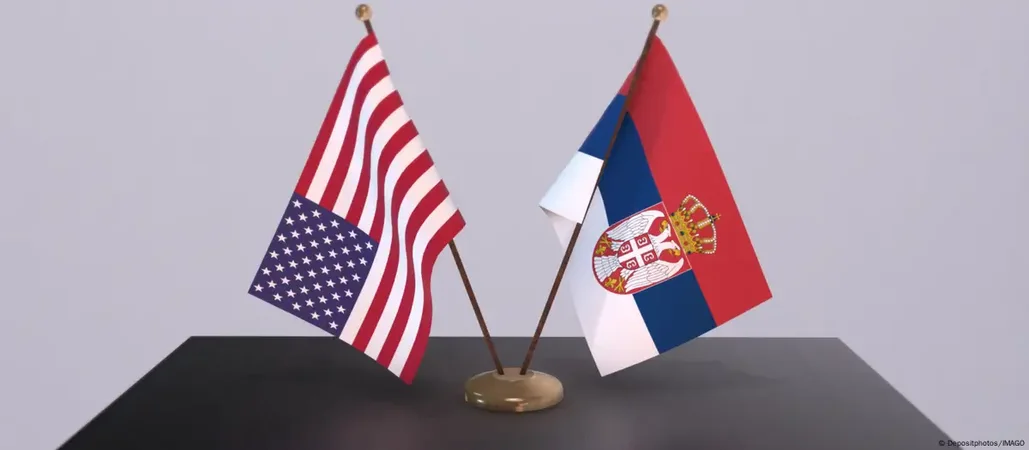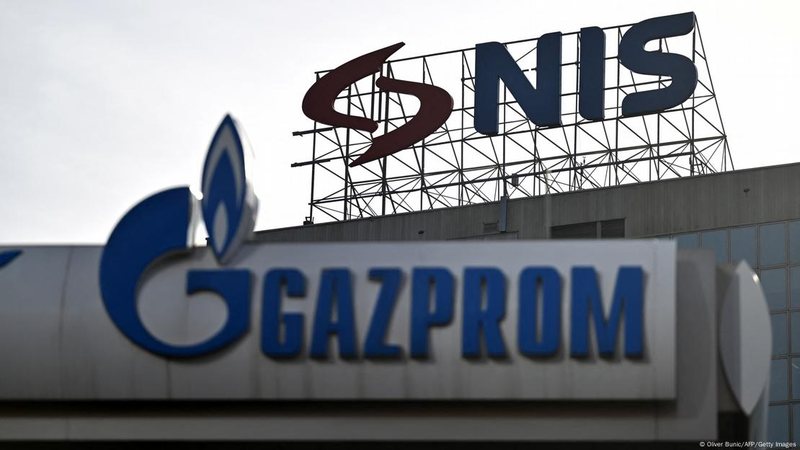
As the start of Donald Trump's second term as US president approaches, Serbian officials have given a boost to relations between the two countries. How realistic are these expectations?
"A new era in Serbia-US relations" was a headline in a boulevard newspaper in Serbia after Donald Trump's victory in the US presidential election last November. This euphoria was also spread by other Serbian newspapers.
Immediately after that, Serbian President Aleksandar Vucic said that during the telephone conversation with the president-elect, he emphasized that the support for Trump's re-election was greater in Serbia compared to other countries in Europe.
"I am confident that he will make America great again, and that we will make Serbia a real country, a country that will be able to cooperate very well with the United States," Vucic said.
Just 10 days before Donald Trump's inauguration, Deputy Secretary of State Richard Verma arrives in Serbia this weekend with the aim of starting a strategic dialogue between Serbia and the US and taking bilateral relations to a higher level.

Serbia: "a reliable partner and ally"
"When the US builds a strategic dialogue with a country, it means that it sees that country as a reliable partner and ally," says Vuk Velebit of the Pupin Initiative, a Belgrade-based NGO that works to strengthen Serbian-Serbian relations. USA.
"Serbia has had strategic agreements with China, Russia and, of course, a special relationship with the EU," Velebi told DW. The fourth pillar of Serbia's foreign policy is the USA, and by signing this strategic dialogue, Serbia will achieve this with Washington, which means that relations with China and Russia along with their influence will be balanced by a relationship special with the US," he added.
Close cooperation despite sanctions?
According to Serbian media, this strategic cooperation will mainly focus on areas such as economy, energy and security.
However, this comes at a time when the US has imposed sanctions on Serbia's oil firm NIS, which is majority-owned by Russian state oil firm Gazprom. These sanctions are part of a broader US package targeting Russia's energy sector.
"They ask us for a complete withdrawal of the Russians from the NIS, not a reduction," Vučić said on January 10, adding that the deadline for the Balkan country to reach an agreement with Russia could be postponed until March 12 at the latest.

For Vuk Velebit, this is a chance for Serbia to change the ownership of NIS. "I think that Serbia will correct the loss-making sale of NIS, which was sold below the market price, making us completely dependent on Russia's energy sector," he told DW.
"It is not good to depend on only one partner, and it is crucial for Serbia not only to regain control over the sector, but also to diversify its energy portfolio. The US and American companies can be a reliable partner for us."
High hopes for the new administration
The euphoria over Trump's return to the White House is most significant, according to Serbian pro-government newspapers, which predict a major dismantling of globalism.
President Vucic himself shares this opinion and is confident that Donald Trump — whom he calls "the leader of the era" — will deliver results.
"Donald Trump is preparing 200 acts, which he will sign on the first or second day of his presidency. When he does this, the entire fake liberal world system will collapse," Vucic said.
Will it have an impact on Serbia-Kosovo relations?
However, beyond the prospect of a "war against the globalists," which also appeals to Serbian officials, the return of the Republicans raises hopes in Belgrade that the US may be more favorable to Serbia in the dialogue process with Kosovo.
Vuk Vuksanovic, a researcher at the Belgrade Center for Security Policy, thinks that these hopes are to some extent realistic.
"The Serbian government certainly does not believe that the Trump administration can change its position on Kosovo, but they believe that in matters such as the economic position of the Serbs in the north of Kosovo and the protection of Serbian monuments and religious centers in Kosovo, there can be an agreement. better with the Trump administration," explains Vuksanovic.
"But the main issue now," he continues, "is whether this political capital will be used for something else, such as securing support from the Trump administration for the government at a time when it is facing more serious problems such as: the protests of students."
Are the hopes justified?
But are the high Serbian hopes justified? Analysts believe that they are, especially since US-Serbian relations have been steadily improving during the years of the Trump and Biden presidencies. "The government in Belgrade has made three major investments in the partnership with the incoming Trump administration: the relationship with Richard Grenell, the deal with Kushner, and the supply of ammunition to Israel in order to gain access to Israeli lobbying and through that to gain access to the White House," says Vuksanovic.
Richard Grenell was the special envoy for negotiations between Serbia and Kosovo and a frequent visitor to Belgrade in 2019 and 2021 during Trump's first term. In 2023, President Vučić awarded him the decoration of the Order of the Serbian Flag Class I for this significant contribution to the strengthening of peaceful cooperation and friendly relations between Serbia and the USA.
Donald Trump Jr. visited Belgrade in 2023 and met with a group of Serbian businessmen to discuss potential investments, and Trump's son-in-law Jared Kushner also has business investments in Belgrade. Serbia signed an agreement with Kushner's firm to revitalize the former Yugoslavian Ministry of Defense headquarters in Belgrade, parts of which were destroyed by NATO bombing in 1999. There are plans to erect two high-rise buildings there. with apartments and hotels in the country. Although the contract itself has not been made public, the New York Times reported in March that the investment has a volume of 500 million dollars (485 million euros) and that the Serbian state is expected to receive 22% of the profit.
Is Trump more interested in Eastern Europe?
Velebit believes that the Trump administration will focus more on Eastern Europe than Western Europe. "For them, the control of Russian influence but also the reduction of Turkish influence will be important, for this reason the relations with Poland, Slovakia, Hungary and Serbia will be decisive," concludes Velebit.
Does this mean that Serbia will change course from east to west? "Western countries have had the biggest stake in Serbia and the Balkans – compared to Russia and China," says Vuksanovic. "But I believe that of all the Western partners of Serbia, the USA will be the most important for Serbia as long as Trump is in power. Moreover, the greatest tensions in relations with Trump and his administration will not will come from Kosovo or Russia, but from relations with China." /DW/ (A2 Televizion)













